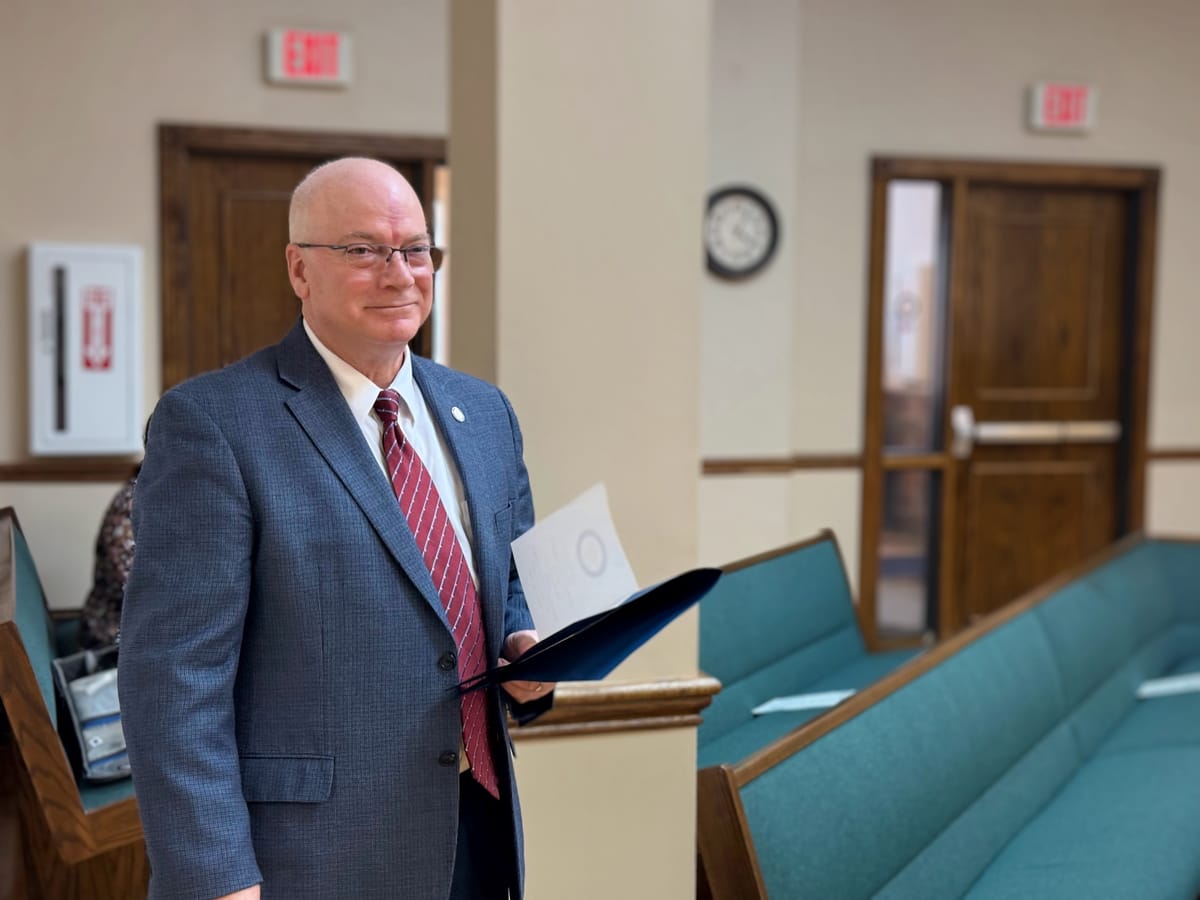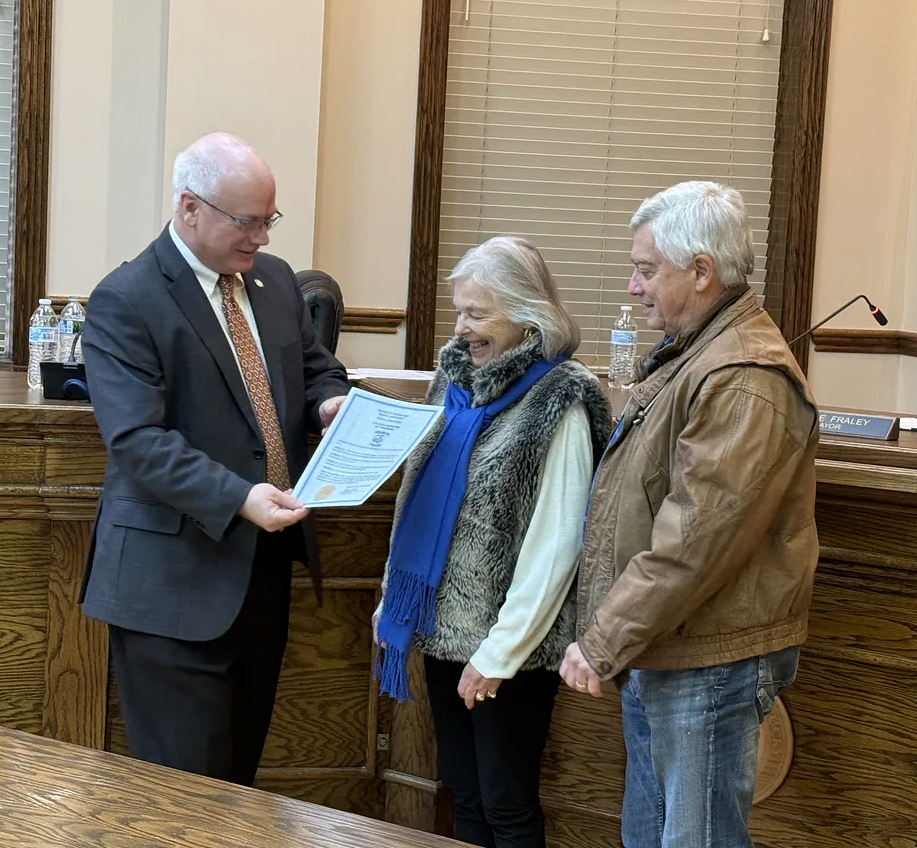Meet your mayor: Bruce Fraley sits down with The Edge
What surprises him, what might surprise you, and what must happen in local government if Berea is to have a bright future

In this installment of The Edge’s Meet Your Municipality feature, Berea’s mayor, Bruce Fraley, shares what motivates him as mayor of his hometown, how he goes about the job, and what he thinks might surprise you about Berea.
Municipal structures in Kentucky
In Kentucky, municipalities are one of two classes. Lexington and Louisville are considered “first class” based on their large populations. The remaining municipalities are classed as “home rule”, meaning the locals determine how to operate and govern, choosing one of three forms of government: a mayor-council, city manager, or commission.
Berea has the form that consists of a mayor as executive and council as the legislature. This means Berea’s mayor oversees personnel and manages the town’s daily activities, according to the Kentucky Leagues of Cities.
Council is responsible for passing the town’s budget, levying taxes, and creating local laws. The mayor meanwhile has the power to veto those laws, and to break ties in council meetings.
More than half of local governments in Kentucky are mayor-council in nature, with the council typically having between six and 12 members. In Berea, all elections are nonpartisan, meaning no one runs on a party platform.
Interview with the mayor
Fraley, a Berea native who grew up on Christmas Ridge, and attended EKU before going to work for the Social Security Administration where he retired a manager out of the Richmond Social Security Field Office, served on Berea City Council from 2017-2018. He won the election for mayor in 2018, taking that office in 2019 and holding it ever since.
Below are his thoughts about Berea and the role of its mayor. Fraley’s responses have been edited for length and clarity.
The Edge: What compelled you to run for the mayor's office?
BF: After spending all those years in the Social Security Administration, I learned I like to serve.
TE: What has been your biggest challenge in the role?
I like things to get done right away in the city government. It always takes longer than I want it to. And a lot of that is necessary just to make sure proper procedures and policies and statute are being followed, but the speed at which government inherently works, whether you're in Berea or Lexington or in some other community, it's inherently slow and it's part of the process.
TE: But you worked for the federal government. That probably didn’t move at lightning speed.
BF: I didn’t have a lot of control over policy [at the SSA], but in terms of service to the public, I did. We were dealing with rules that were given to us, we weren’t part of the policy making process, but I felt like I could effectuate decisions and I could get projects done at the local level faster in the federal government than I can locally.
We had about 17 people, so we were pretty nimble, and we could move and make sure claims were processed, make sure people are seen quickly, and make sure that there was customer satisfaction.
TE: What has been the biggest surprise for you in office as mayor?
BF: How expensive things are. A good example is a ladder truck that we just had to replace. I think it was 17 years old, and the cost to replace it, if we would have ordered it, was about $1.8 million. We were actually able to produce one that had been in the process of being built for over a year for a city in northern Kentucky, who no longer wanted it.
We were able to buy it for a discount, but the discount cost was still $1.5 million. So, the expense of the equipment that is necessary to provide world class service to the people who live in the city of Berea, the cost of that is probably what surprises me the most. And there's no way around it. Well, there's a way around it, you know, you go with less and then you don't have world class service and, I don't wanna do that. I want the people that live here to have a world class fire truck.
TE: What about your job would surprise Bereans if ‘they only knew’?
BF: Probably what would surprise most citizens is how well Berea is thought of outside of the community. From the eastern part of the state to the western part of the state to people that are out of state, they all talk about how beautiful and charming Berea is, how unique it is with its arts and crafts, with Berea College and its student labor. So if you are out of town, people inevitably know about Berea. We’re looked at very favorably as a strong, vibrant community.
TE: What do you like most about the job?
BF: What I like most about the job is being more closely connected with the community, with individual people, with institutions like a nonprofit, Berea College, or EKU for that matter; being more closely connected with business and industry that’s in Berea; being more closely connected with our tourism economy.
I think that just the exposure that you get as a mayor to all those things that are so important to our town is what I enjoy the most and I’m learning every day. That learning process kind of goes along with the interaction and collaboration that you have on a daily basis.

TE: What’s so important to you about being connected? Why do you care about that?
BF: You need to know what the real needs of people are. You need to know that your policies and your priorities are in line with the expectations of the businesses here. I think you are more able to do that if you immerse yourself into the position [as mayor].
TE: What is your current focus as mayor?
BF: I am laser focused on doing everything that I can to maintain and improve the quality of life for everyone who lives in the city of Berea, and the businesses that have invested money to do business here. I want to provide world class service police, fire, parks, codes and planning, and tourism. That’s always going to be my focus, and then there are a lot of things that you focus on to make that happen.
TE: That begs the question of what do you need to do to bridge any gaps to that “world class service” you mention?
BF: Well, that’s a really broad question. There’s not just one gap. Is there one gap in particular — development is a big part of our quality of life. If you can raise the standard of living, you can have a positive impact on the quality of life. So that's one particular area.
But there are other things that are not as tangible such as infrastructure. The streets and roads — we have to maintain our own streets, but also work closely with the Kentucky transportation cabinet because we have so many state and county roads that run through Berea. For instance, Chestnut Street is totally a federal and state highway — US 25 and US 21. Scaffold Cane Road is 100% a state highway. It’s Highway 595. And, you know, we could go on. There are all kinds of state highways here.
Water and sewer infrastructure are things that you don’t see, but you have to plan for. So when you talk about gaps, there are a lot of little gaps that kind of make up that whole quality of life that you have to focus on.
TE: What would you like to see in Berea’s future?
BF: My vision for the foreseeable future for Berea is to maintain our unique culture, and our unique quality of life. Berea is a unique community and I hope it’ll stay that way.
I also hope to see smart growth raising the standard of living, raising average income levels, having adequate housing for people who want to live here, and maintaining our infrastructure. From roads, to water and sewer infrastructure, to electric infrastructure, doing everything we can to make things world class. That's what I really want for my friends and neighbors who live here and have businesses here.
What might get in the way of that is where the national political division and bitterness trickles down to the local level if you're not careful. There's a lot of wisdom in our state motto, “United we stand, divided we fall.” So becoming divided as citizens and allowing those divisions to impact our government structure, we need to avoid that.
Remember that you’re a Berean first and so you treat city government and what we do here as it’s intended to be, which is as a nonpartisan city government that acts in the interest of all. It is not supposed to be just for some and against others. We can't be that way, ever. You can't control that at the federal level, but I think we can control it when it comes here by just keeping first and foremost our state motto.
TE: What's a memory of your time in leadership that is special to you?
BF: One of the things that is the most important, that is kind of burned into my memory is being sworn in. I'm just the little kid that grew up in the woods on Christmas Ridge, you know, I'm nobody special.
So, being sworn in as mayor for the first term is probably the most memorable because, you know, I'm a native Berean. It's not something I dreamed would ever happen. I've got a lot of work to do for the people that live here and I want to do the work to preserve and make it better for future generations.
The Edge is your online source for all things Berea. Please consider becoming a free or paid subscriber.
Update: Bruce Fraley had 17 employees while working at the Richmond Social Security Field Office. Previously, 70 was reported. Also, Fraley served as a council member from 2017-2018. Previously, 2016-2018 is what The Edge reported. This update was made on Friday, January 24, 2025, at 4:46 PM.
